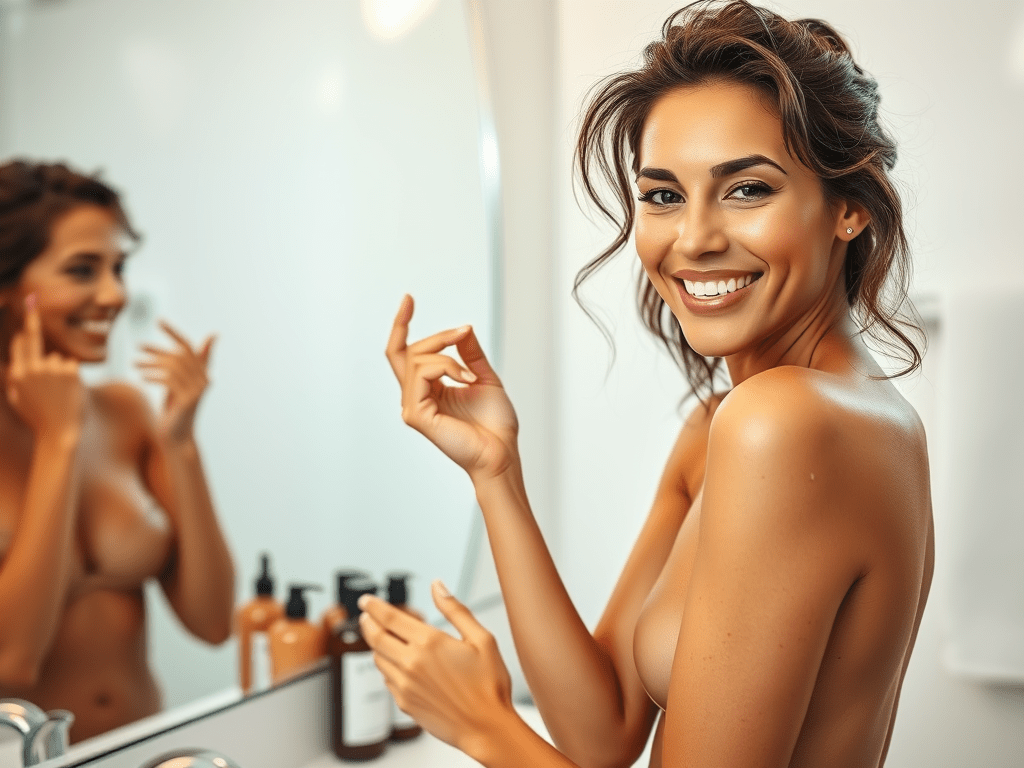
Radiant Skin Awakens: Unveiling the Goddess-Approved Suncare Secrets
Sunscreen is often overlooked in daily skincare routines, yet it plays a crucial role in protecting our skin from harmful UV rays. This article explores the risks associated with sun exposure and how proper sunscreen application can prevent sunburn, premature aging, and skin cancer.
The Risks and Remedies of Sun Exposure
What are the Risks of Sun Exposure?
Exposure to the sun's ultraviolet (UV) rays can have a significant impact on our skin's health and appearance. Understanding the potential risks associated with sun exposure is crucial for maintaining a balanced and healthy lifestyle.
The primary risks of sun exposure include:
- Sunburn: Overexposure to UV rays can lead to painful, red, and inflamed skin, which can increase the risk of skin cancer.
- Premature Aging: The sun's UV radiation can break down the skin's collagen and elastin, leading to the development of wrinkles, fine lines, and age spots prematurely.
- Skin Cancer: Prolonged exposure to UV rays can damage the DNA in skin cells, increasing the risk of developing various types of skin cancer, such as melanoma, basal cell carcinoma, and squamous cell carcinoma.
- Eye Damage: The eyes are also susceptible to UV damage, which can lead to conditions like cataracts, macular degeneration, and even cancer of the eyelids.
How does Sunscreen Protect Your Skin?
Sunscreen is a crucial tool in the arsenal against the harmful effects of the sun's UV rays. Understanding how sunscreen works can help you make informed decisions about protecting your skin.
Sunscreen works by:
- Absorbing or Reflecting UV Rays: Sunscreens contain active ingredients that either absorb or reflect the sun's UV rays, preventing them from penetrating the skin.
- Providing Broad-Spectrum Protection: Effective sunscreens protect against both UVA and UVB rays, which can both contribute to skin damage and cancer.
- Reducing the Risk of Sunburn: By blocking the sun's harmful rays, sunscreen helps prevent the development of painful and potentially dangerous sunburns.
- Slowing the Signs of Aging: By shielding the skin from UV exposure, sunscreen can help reduce the premature development of wrinkles, fine lines, and age spots.
Can Sun Damage Happen Without Direct Sunlight?
While the sun's direct rays are the primary source of UV exposure, it's important to understand that sun damage can occur even without direct sunlight. This is a common misconception that can lead to complacency and increased risk of skin problems.
Even in the absence of direct sunlight, sun damage can occur through:
- Reflected UV Rays: UV rays can be reflected off surfaces like water, sand, snow, and even concrete, causing indirect exposure to the skin.
- Cloud Cover: Contrary to popular belief, clouds do not provide full protection from UV rays. Significant amounts of UV radiation can still penetrate through cloud cover and reach the skin.
- Window Glass: While regular window glass can block UVB rays, it does not effectively block UVA rays, which can still cause skin damage over time.
- Artificial Light Sources: Some indoor lighting, such as certain types of fluorescent bulbs, can also emit low levels of UV radiation that can contribute to skin damage.
Understanding the risks of sun exposure and the protective power of sunscreen is crucial for maintaining healthy, youthful-looking skin. By incorporating these insights into your daily skincare routine and being mindful of your sun exposure, you can enjoy the benefits of the outdoors while minimizing the potential for long-term skin damage.
The Ultimate Guide to Choosing the Right Sunscreen
What Ingredients Should You Seek?
When it comes to choosing the right sunscreen, the ingredients list is crucial. Certain ingredients are more effective than others at protecting your skin from the harmful effects of UV radiation.
The key ingredients to look for in a sunscreen are:
- Zinc oxide and titanium dioxide: These are known as physical or mineral sunscreens, and they work by reflecting and scattering UV rays before they can penetrate the skin.
- Avobenzone, oxybenzone, and sulisobenzone: These are chemical sunscreens that absorb UV rays, converting them into heat that is then released from the skin.
- Vitamin C and E: These antioxidants can help neutralize free radicals and provide additional protection against sun damage.
Is SPF the Only Factor That Matters?
While SPF (Sun Protection Factor) is an important consideration, it's not the only factor to look for in a sunscreen. There are several other factors that can impact the effectiveness of a sunscreen.
Other factors to consider include:
- Broad-spectrum protection: Sunscreens should protect against both UVA and UVB rays, which can both contribute to skin damage and increased risk of skin cancer.
- Water resistance: If you'll be swimming, sweating, or engaging in activities that may cause the sunscreen to be washed off, look for a water-resistant formula.
- Application amount: Most people don't apply enough sunscreen, which can reduce the effectiveness. The recommended amount is about 1 ounce (2 tablespoons) for the entire body.
- Expiration date: Sunscreens can lose their effectiveness over time, so be sure to check the expiration date and replace old sunscreens.
What is Broad-Spectrum Protection?
Broad-spectrum protection is a key feature to look for in a sunscreen, as it indicates that the product protects against both UVA and UVB rays.
The differences between UVA and UVB rays are:
- UVB rays are the primary cause of sunburns and are often associated with the development of skin cancer.
- UVA rays penetrate deeper into the skin and can contribute to premature aging, wrinkles, and other long-term skin damage.
- A broad-spectrum sunscreen will protect against both types of UV rays, providing more comprehensive protection for your skin.
In summary, when choosing a sunscreen, it's important to look beyond just the SPF and consider the active ingredients, broad-spectrum protection, water resistance, and proper application. By taking these factors into account, you can ensure that you're using a sunscreen that will effectively protect your skin from the harmful effects of UV radiation.
The Secrets to Flawless Sun Protection
What is the Right Application Routine?
Applying sunscreen correctly is crucial to ensuring adequate protection from the sun's harmful UV rays. Many people make common mistakes when it comes to applying sunscreen, leading to potential skin damage and increased risk of sunburn.
The key to getting the most out of your sunscreen is to follow a systematic application routine.
- Start by ensuring you have the right sunscreen for your skin type and sun exposure needs. Look for a broad-spectrum formula with an SPF of 30 or higher.
- Apply a generous amount of sunscreen to all exposed areas of your skin, including your face, neck, ears, and any other visible areas. Dermatologists recommend using about 1 ounce (a shot glass full) to cover your entire body.
- Take your time and make sure to apply the sunscreen evenly, paying close attention to often-missed spots like the lips, eyelids, and around the hairline.
By taking the time to properly apply your sunscreen, you can rest assured that your skin is getting the full protection it needs to stay safe in the sun.
How Much Sunscreen Do You Really Need?
Many people apply far too little sunscreen, leading to inadequate protection and an increased risk of sunburn and skin damage. Knowing how much sunscreen to use is crucial for achieving the full SPF rating on the bottle.
The general rule of thumb is that you should apply about 1 ounce (a shot glass full) of sunscreen to your entire body.
- This amount is necessary to achieve the SPF level stated on the product label. Applying less than the recommended amount can reduce the sunscreen's effectiveness by as much as 50%.
- It's important to reapply sunscreen every 2 hours, or more frequently if swimming or sweating. Each reapplication should also use about 1 ounce of product.
- Don't skimp on the sunscreen, especially on exposed areas like the face, ears, and neck. These are common places for sun damage to occur.
Investing in a generous amount of high-quality sunscreen is a small price to pay for the protection of your skin's health.
Should You Reapply Sunscreen Throughout the Day?
Reapplying sunscreen is often overlooked, but it's a crucial step in maintaining adequate sun protection throughout the day. Many people make the mistake of applying sunscreen only once in the morning and then failing to reapply.
Dermatologists unanimously agree that reapplying sunscreen is essential for full, lasting protection.
- Sunscreen can become less effective over time, especially if you're swimming, sweating, or toweling off. Reapplying every 2 hours, or more frequently if engaged in water activities, is recommended.
- Pay close attention to often-missed spots like the lips, ears, and around the hairline, as these areas are particularly vulnerable to sun damage.
- Bring a travel-size sunscreen with you and make reapplication a regular part of your outdoor routine, just like you would with other sun-safe habits like seeking shade and wearing protective clothing.
By making sunscreen reapplication a habit, you can ensure your skin stays protected all day long and reduce your risk of painful sunburns and long-term sun damage.
Radiant Skin Awakens: Unveiling the Goddess-Approved Suncare Secrets
Goddess Glow Shimmer Suntan Lotion SPF 40 - Reef-Safe Radiance
Experience the ultimate beach goddess glow with our Organic Shimmering Suntan Lotion. Infused with shimmering mica minerals, this lightweight reef-safe broad-spectrum sunscreen with shimmer not only offers SPF 40 UVA/UVB protection but also adds a soft, subtle sheen to enhance any skin tone.
Elevate Your Skin to Celestial Heights with This Radiant Masterpiece!
- Shimmering Glow: Illuminate like a sun goddess with shimmering mica minerals that add a mesmerizing, healthy-looking radiance to your skin.
- Easy Application: Effortlessly apply and quickly dry this sunscreen with glitter for instant radiance, no hassle required.
- Water Resistant: Enjoy 40 minutes of water resistance while maintaining silky-smooth, hydrated skin, perfect for poolside lounging or splashing in the waves. 🌊
- Broad-Spectrum Protection: This reef-safe sunscreen shields your skin from both UVA and UVB rays, ensuring comprehensive sun defense.
- Lightweight and Nourishing: The formula is remarkably lightweight and quickly absorbs, leaving your skin feeling soft, smooth, and never greasy.
Organic Reef-Safe Sunscreen - Broad Spectrum SPF 40
Introducing our Glimmer Goddess Organic Reef-Safe Sunscreen, a superior choice for your skin and the environment. Here's why you'll love it:
Unleash the Power of Nature's Bounty for Radiant, Protected Skin
- Certified Organic Ingredients: This sunscreen is crafted with a gentle yet effective blend of certified organic ingredients, ensuring a safe and nourishing shield against harmful UV rays.
- Powerful Mineral Sunscreen: Featuring un-coated non-nano Zinc Oxide, along with natural plant oils like red raspberry seed oil and pomegranate seed oil, this sunscreen provides maximum sun protection while deeply moisturizing your skin.
- Lightweight and Quick-Drying: The formula absorbs rapidly without leaving a greasy residue, making it perfect for active lifestyles and everyday wear.
- Waterproof and Sweat-Resistant: Enjoy up to 40 minutes of water resistance, so you can confidently embrace your active pursuits without worrying about reapplying.
- Reef-Safe and Environmentally Conscious: Knowing that your sunscreen is kind to both your skin and the delicate coral reefs adds an extra layer of peace of mind.
Q&A
What are the main risks of sun exposure?
The main risks of sun exposure include sunburn, premature aging (wrinkles and age spots), an increased risk of skin cancer, and potential eye damage from UV rays.
How does sunscreen protect my skin?
Sunscreen protects the skin by absorbing or reflecting UV rays, providing broad-spectrum protection against both UVA and UVB rays, reducing the risk of sunburn, and slowing the signs of aging.
Can I get sun damage without direct sunlight?
Yes, sun damage can occur without direct sunlight as UV rays can be reflected off surfaces, penetrate through clouds, be transmitted through window glass, and even be emitted from certain artificial light sources.
What ingredients should I look for in sunscreen?
Look for active ingredients like zinc oxide and titanium dioxide for broad-spectrum physical protection, or avobenzone and oxybenzone for chemical protection. Antioxidants such as vitamin C and E can also provide additional benefits.
How much sunscreen do I need to use?
It's recommended to apply about 1 ounce (a shot glass full) of sunscreen to cover your entire body. Reapply every 2 hours, or more often if sweating or swimming, using the same amount each time.
Why is reapplying sunscreen important?
Reapplying sunscreen is crucial because it maintains skin protection against UV rays, which can diminish over time due to sweating, swimming, or simply wearing off. Regular reapplication helps prevent sunburn and long-term skin damage.
Incorporating sunscreen into your daily routine is essential for maintaining healthy skin and protecting against the dangers of sun exposure. By understanding how to choose and apply sunscreen effectively, you can enjoy the outdoors without compromising your skin's health.



